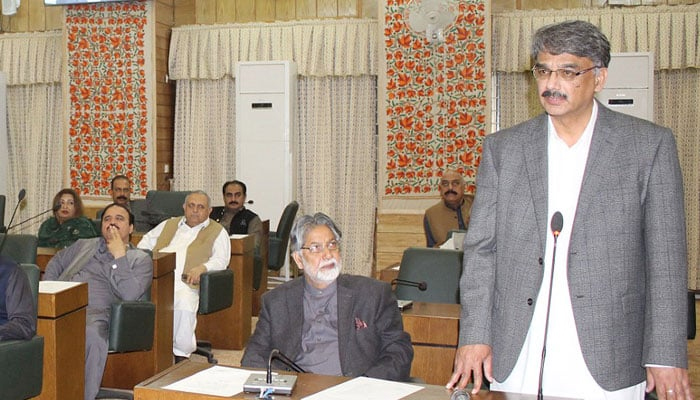AJK not getting financial share, hydel profits: PM
AJK PM spoke to Senate Standing Committee on Finance, which met under the chairmanship of Senator Mandviwalla
ISLAMABAD: Azad Jammu and Kashmir Prime Minister Chaudhry Anwarul Haq appeared before a panel of the Upper House of Parliament on Wednesday and complained that the federal government was not paying its constitutional financial share and hydel profits.
The AJK premier spoke to the Senate Standing Committee on Finance, which met under the chairmanship of Senator Saleem Mandviwalla here on Wednesday.
He said the AJK had displaced its cities for the construction of Mangla Dam and the Neelum-Jhelum Hydropower Project in its territory and provided 2,660 MW of electricity, but its requirement was just standing at 350 MWs. Now the federal government has deducted its outstanding dues of Rs61 billion but has not bothered to pay its share of Rs400 billion from net hydel profit. There is an agreement on the net hydel profit share in the case of one dam, but it is missing in the case of the second one, he added.
Now we have been squeezed so much that the people have started raising their voices, he said, reminding under Article 157 of the Constitution, AJK was guaranteed to be provided 3.46 percent of the Federal Divisible Pool (FDP). He said when all governments at the federal and provincial levels had raised the salaries of their employees, AJK was given advice not to increase the salaries of 109,000 employees in its public sector. Then he was left with no other choice but to slash down the annual development plan for raising salaries in the budget.
Secretary Finance Imdad Bosal replied that the net hydel profit-related issue would be taken up with the Ministry of Power. He said the government had provided Rs70 billion to AJK for the current fiscal year, up from Rs59 billion in the last financial year. The AJK premier again protested the wording of the grant and said that it was the constitutional share of AJK. He said that there should be no deduction in the share of AJK, and the federal government should release the whole committed amount.
He said he did not know how power distribution companies used to calculate their outstanding dues against AJK. The AJK dams generated cheap electricity, and when it became part of the national grid, consumers were charged much higher rates. Now the people of AJK have started protests against inflated power bills, and he did not have the words to justify such billing. Protests had started in parts of AJK but now spread all over the country, he added. The committee members unanimously supported AJK’s demands and asked the Ministry of Finance and Power to find an amicable solution to the problems.
-
 Czech Republic Supports Social Media Ban For Under-15
Czech Republic Supports Social Media Ban For Under-15 -
 Prince William Ready To End 'shielding' Of ‘disgraced’ Andrew Amid Epstein Scandal
Prince William Ready To End 'shielding' Of ‘disgraced’ Andrew Amid Epstein Scandal -
 Chris Hemsworth Hailed By Halle Berry For Sweet Gesture
Chris Hemsworth Hailed By Halle Berry For Sweet Gesture -
 Blac Chyna Reveals Her New Approach To Love, Healing After Recent Heartbreak
Blac Chyna Reveals Her New Approach To Love, Healing After Recent Heartbreak -
 Royal Family's Approach To Deal With Andrew Finally Revealed
Royal Family's Approach To Deal With Andrew Finally Revealed -
 Super Bowl Weekend Deals Blow To 'Melania' Documentary's Box Office
Super Bowl Weekend Deals Blow To 'Melania' Documentary's Box Office -
 Meghan Markle Shares Glitzy Clips From Fifteen Percent Pledge Gala
Meghan Markle Shares Glitzy Clips From Fifteen Percent Pledge Gala -
 Melissa Jon Hart Explains Rare Reason Behind Not Revisting Old Roles
Melissa Jon Hart Explains Rare Reason Behind Not Revisting Old Roles -
 Meghan Markle Eyeing On ‘Queen’ As Ultimate Goal
Meghan Markle Eyeing On ‘Queen’ As Ultimate Goal -
 Japan Elects Takaichi As First Woman Prime Minister After Sweeping Vote
Japan Elects Takaichi As First Woman Prime Minister After Sweeping Vote -
 Kate Middleton Insists She Would Never Undermine Queen Camilla
Kate Middleton Insists She Would Never Undermine Queen Camilla -
 King Charles 'terrified' Andrew's Scandal Will End His Reign
King Charles 'terrified' Andrew's Scandal Will End His Reign -
 Winter Olympics 2026: Lindsey Vonn’s Olympic Comeback Ends In Devastating Downhill Crash
Winter Olympics 2026: Lindsey Vonn’s Olympic Comeback Ends In Devastating Downhill Crash -
 Adrien Brody Opens Up About His Football Fandom Amid '2026 Super Bowl'
Adrien Brody Opens Up About His Football Fandom Amid '2026 Super Bowl' -
 Barbra Streisand's Obsession With Cloning Revealed
Barbra Streisand's Obsession With Cloning Revealed -
 What Did Olivia Colman Tell Her Husband About Her Gender?
What Did Olivia Colman Tell Her Husband About Her Gender?




